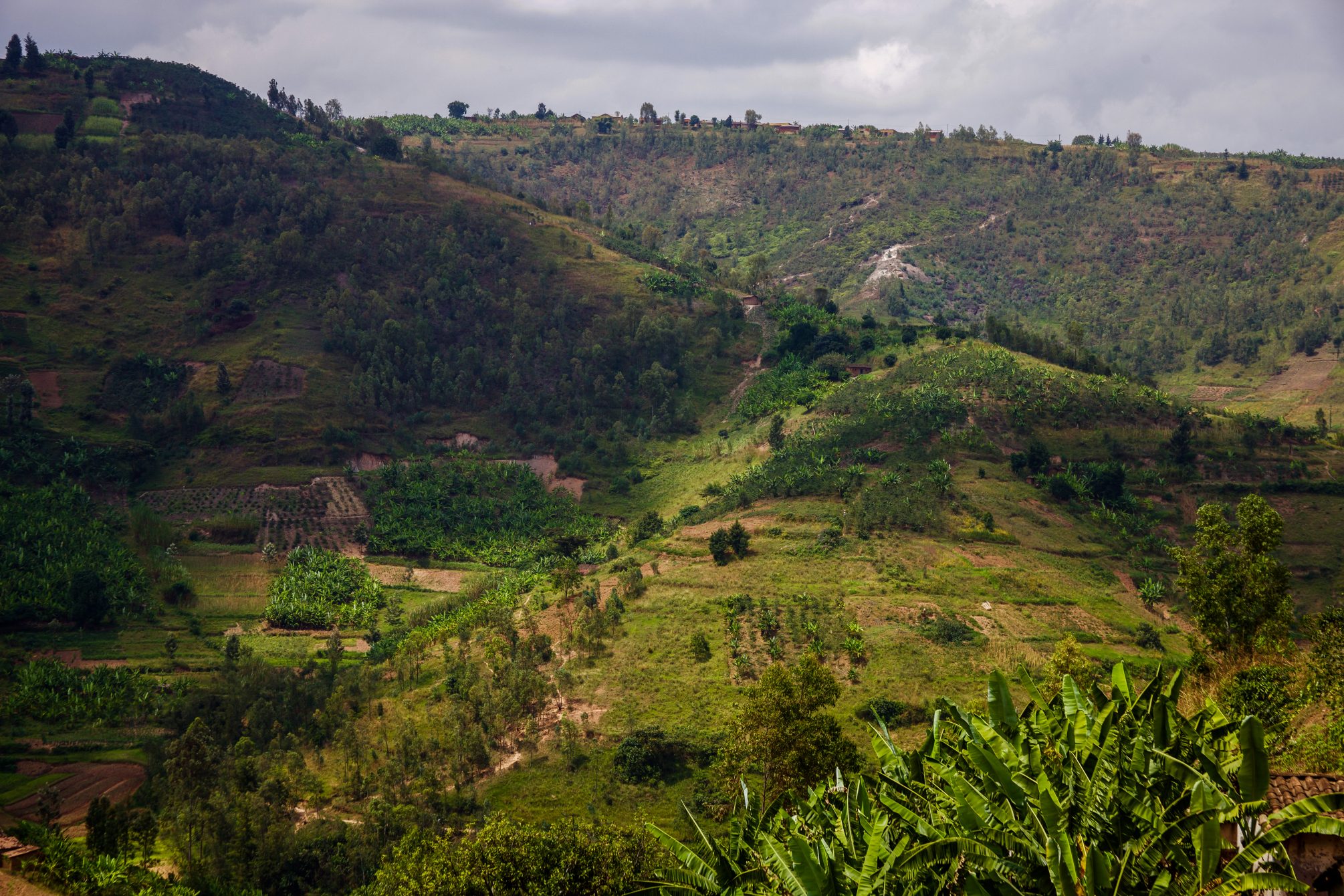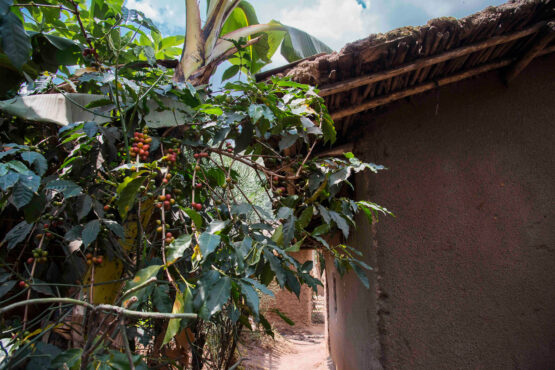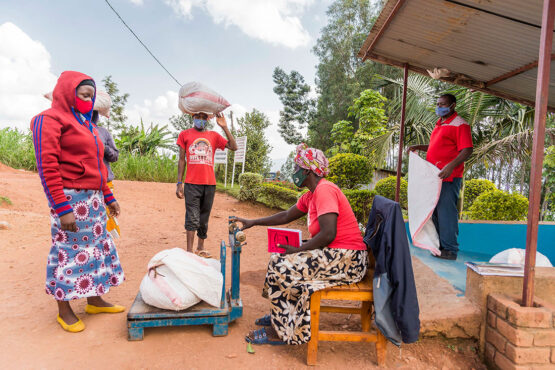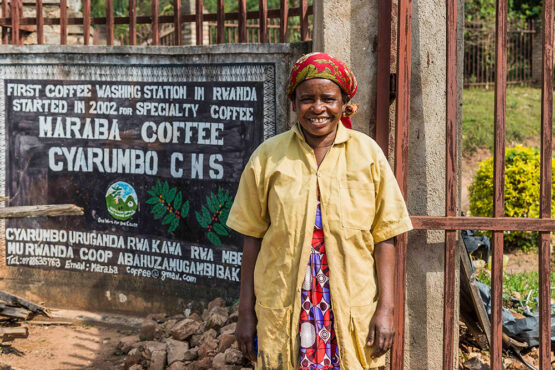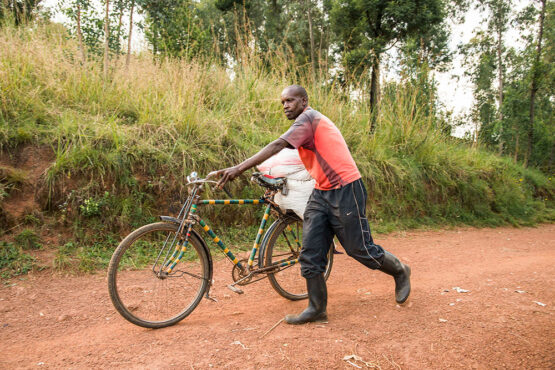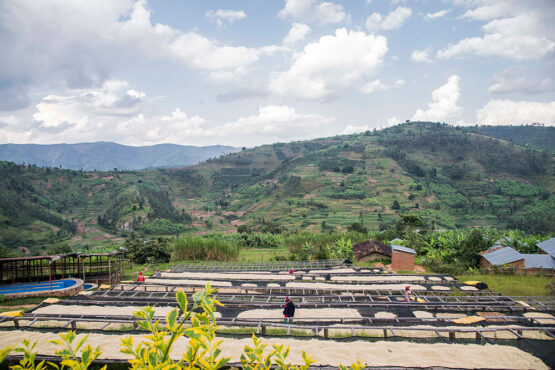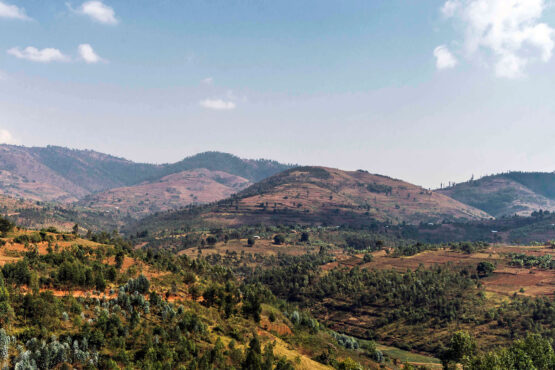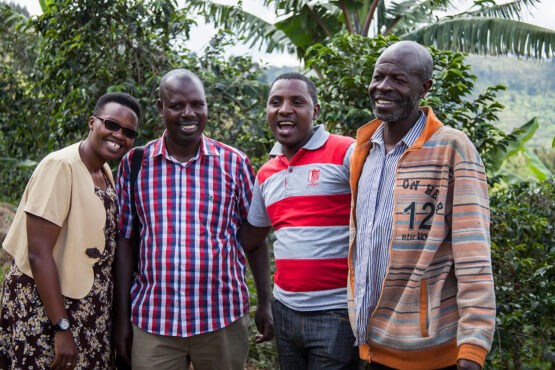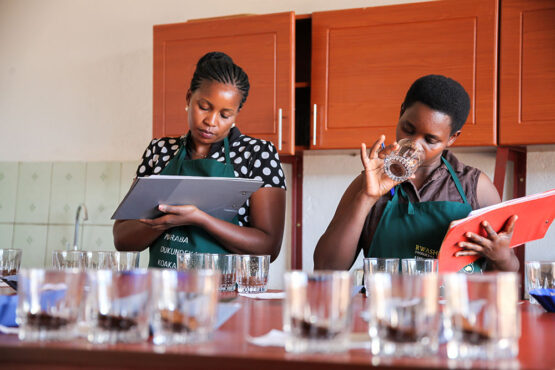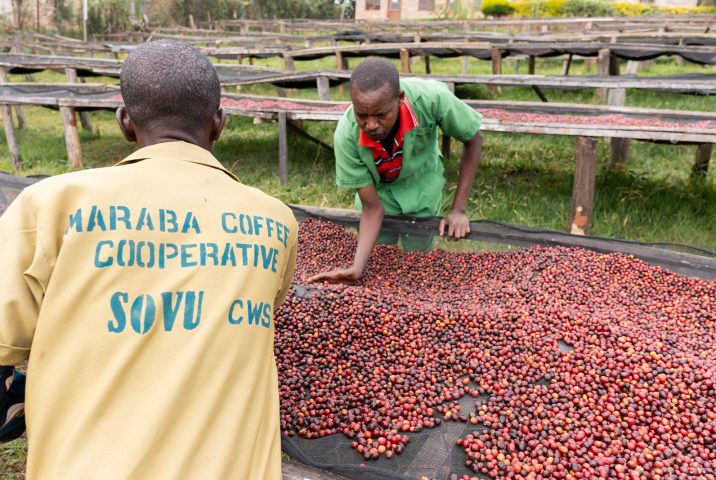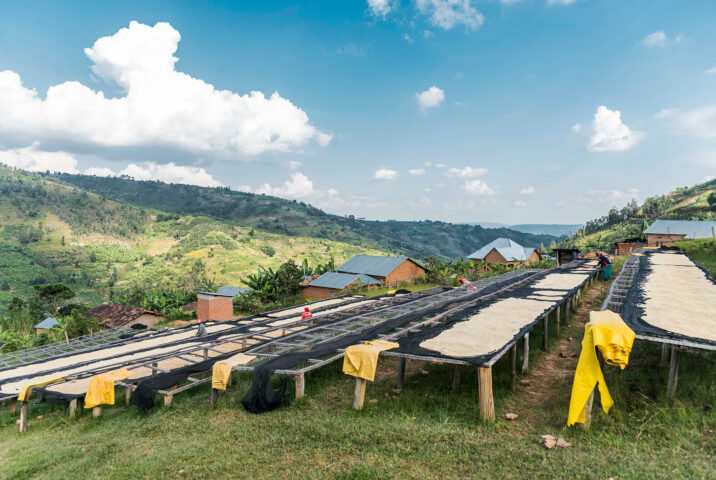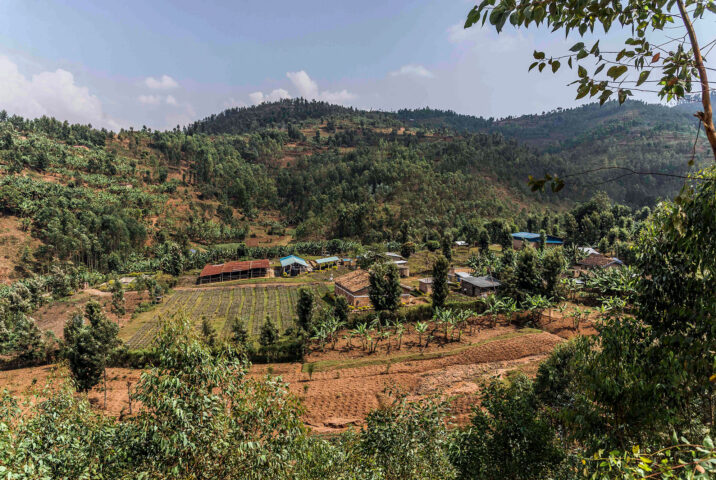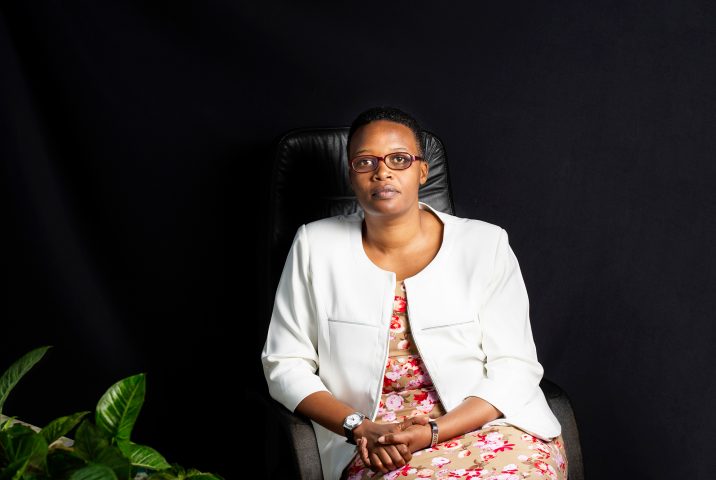Rwanda
Known as the ‘Land of One Thousand Hills,’ Rwanda is filled with lush mountains that stretch as far as the eye can see.
All of Rwanda sits at a high elevation (its lowest point is 950 metres above sea level). This topography – along with the country’s rich, fertile volcanic soils, Red Bourbon variety coffee trees, and a temperate climate with plenty of sun and equatorial mist – makes it the perfect place to grow high-quality coffee.
Rwanda is small – only 26,338 square kilometres in size; less than half the size of Tasmania – and it also happens to be the most densely populated country in Africa. Most of the 13.3 million-strong population is rural, with 70% of people involved in agriculture. The majority of these farmers lead subsistence lives, working only to feed themselves and their families. Nearly every patch of land is under cultivation (with the exception of protected national parks, which make up one-seventh of the country) and even in the capital, Kigali, you will find fields of plantain, maize and cassava growing on any spare patch of green. In total, the agricultural sector contributes about 31% of Rwanda’s GDP. Of that, coffee is by far the largest export, accounting for 29% of the country’s agricultural export income.
The vast majority of coffee grown in Rwanda is Arabica, and 95% of it is one of several long-established Bourbon varieties. Coffee is mainly produced by 400,000 or so small-scale farmers, who own, on average, less than a hectare of land, or around 175 coffee trees. These trees are grown alongside other subsistence crops, such as maize and beans. Flowering takes place in September and October and harvest usually runs from April to July.
In global coffee terms, Rwanda is a relatively small producer. Its annual coffee output is around half the size of that of Kenya or Tanzania, and 11 times smaller than Ethiopia. Despite its small size, Rwanda has the potential to produce exceptional specialty-grade coffee. It is only in the last 20 years that this potential has been realised and recognised by specialty buyers across the globe.
History of Coffee in Rwanda
It’s believed that coffee was introduced to Rwanda by German missionaries at the end of the 19th century. In 1933, the colonial Belgian government mandated farmers to grow coffee on at least a quarter of their land. The crop became the main source of revenue for rural families, but the focus was on high yield and low grade. From the 1960s, most coffee produced was sold to a government-controlled exporting organisation called Rwandex, which dictated the prices that farmers received, removing any incentive for them to improve the quality of the cherries they delivered.
In the early 1990s, world coffee prices collapsed due to increased global production and the consolidation of purchasing by multinational corporations. With the cost of production higher than the selling price, many farmers pulled up coffee trees to plant food crops instead, halving the country’s total output. In 1994, the country experienced a devastating genocide, which claimed the lives of nearly a million people, destroyed the economy and decimated the workforce. Many coffee farms were deserted and much of the specialised knowledge needed to grow coffee profitably was lost.
From this horrific destruction, Rwanda slowly stabilised and regenerated in an extraordinary way. The Rwandan coffee industry has since completely revolutionised, and has become a key driver of economic growth. The crop has transformed the lives of thousands of rural Rwandans, and helped create jobs, develop skills and rebuild communities.
Major reform to the coffee industry began in 2000, when coffee was recognised as one of a handful of sectors that could revive the national economy, and the industry began to receive the support of government, NGOs and the private sector. It soon became apparent that the most sustainable strategy would be to add value to Rwandan coffee through the production of a higher quality product, as the industry would reap greater economic returns and be less vulnerable to fluctuations in the commodity market. Furthermore, coffee was already grown throughout the country by small-scale farmers along with their subsistence crops, so a higher financial yield on coffee would not lead to greater food vulnerability.
So the hard work began, to develop and reshape the industry to support quality production. President Kagame liberalised coffee trade, sold the government’s interest in Rwandex, and worked with donors to develop the infrastructure needed to produce and process specialty grade coffee. This involved supporting and facilitating the formation of coffee cooperatives that established washing stations, as well as investing heavily in the education of the people who proces coffee and, increasingly, the people who grow it.
The creation of cooperatives in Rwanda has allowed the country’s small growers to combine their harvests into larger volumes that are easier to mill and prepare for export, instead of tiny parcels produced by individual farms. This has given these small producers better access to foreign markets, enabling them to sell coffee more directly, rather than having to rely on the domestic market or international exporters. NGOs such as the USAID-funded PEARL and SPREAD have created and supported the development of these cooperatives, training their members in farming techniques, coffee processing, quality control and marketing.
The establishment of washing stations has greatly improved the quality of coffee produced in Rwanda, as individuals, cooperatives and local buying groups now have better control over the various aspects of production.
The very first private washing station was built in 2001, and over 200 more have been established since. In addition to having a dramatic impact on the quality of coffee produced, washing stations have played an important role in job creation and skill development, with many employees learning valuable business skills in accounting, marketing and management.
Shifting the focus of Rwanda’s coffee sector from one of quantity to one of quality has produced a multitude of benefits. Reform in the coffee sector has played an important part in helping thousands of rural farmers increase their income, which has benefited not only the individual, but also their families and communities, enabling them to spend more on education and medical expenses, and to ensure better food security.
The cooperatives and washing stations have also generated positive social benefits. Both have played an important role in bringing different groups together and, through ongoing interactions, have significantly helped to reduce ethnic distance and alienation between members of Rwandan society. The rise of women-led coffee projects has also been transformative: by working together and supporting each other, women in Rwanda’s coffee sector have become more self-reliant and independent of their husbands and families.
Key Coffee-Growing Regions
Today, after over two decades of investment, education and hard work, the Rwandan specialty coffee industry is fully established and internationally recognised for its exceptional output. Thanks to this tremendous effort, coffee is found in four of Rwanda’s five provinces: Northern Province, Southern Province, Western Province and Eastern Province. Each of these is subdivided into several districts, and each district is made up of various sectors. For over a decade, we have been delighted to work with washing stations found in two of these provinces:
NORTHERN PROVINCE
Rwanda’s Northern Province experiences the coolest year-round temperatures in Rwanda. This is great for coffee farming, as it allows for coffee cherries to mature slowly and develop more complex and elegant flavours. The province’s north is bordered by a chain of 8 extinct volcanoes known as the Virunga Mountains, and mineral-rich, volcanic soils are found throughout the whole region. Not only do these two factors create a rich biodiversity, but they also make it Rwanda’s most agriculturally active region. Although the province is made up of 5 districts, we focus on coffees grown on only one of these, the district of Gakenke, due to its comparatively large number of coffee trees and growers. Here, our partners at Dukunde Kawa Cooperative operate two washing stations in the district of Ruli, and another one in the district of Coko.
Coffees from the Northern Province tend to have noticeable floral characteristics up front and a pronounced acidity. This creates a well-defined structure in the cup that is usually complemented by bright, tropical fruit flavours and a clean finish.
SOUTHERN PROVINCE
Rwanda’s Southern Province receives more rainfall than any of the country’s other coffee-growing regions. Because temperatures here aren’t as cool as those up north, this higher rainfall is key in ensuring coffee cherries develop sugars at a steady rate. The combination of warm days and cooler, rainy evenings leads to coffees with distinct sweetness and a richer depth of flavour. The province is divided into 8 districts, and we source coffees from 3 of them: Kamonyi, Nyamagabe and Huye. The latter is of particular significance to Rwanda’s coffee community, as the country’s first washing station was established here by the Abahuzamugambi Ba Kawa Maraba Cooperative (or ‘Maraba’) in 2001.
Coffees from the Southern Province are characterised by a jammy sweetness and a juicy acidity – much like a ripe red apple! They tend to have a syrupy body and a lingering finish that remind us of raisins, brown sugar and chocolate.
Our Supply Partners
We are inspired and energised every time we visit Rwanda and feel very lucky to represent and share the beautiful coffees, and incredible stories behind them with roasters and consumers in Australia — it’s no surprise we have been working with many of the same washing stations and cooperatives since we started sourcing coffee from Rwanda in 2008! Over the years, we have been able to maintain and strengthen these ties thanks to the help and on-the-ground logistical support our export partner, Rwandan Smallholder Specialty Coffee Company, RWASHOSCCO.
Founded in 2005, RWASHOSCCO is a farmer-owned marketing, exporting and roasting company that provides many key services to coffee growers in Rwanda. Led by Angelique Karekezi, RWASHOSCCO’s goal is to link coffee farmers to international markets and buyers to ensure farmers get their work’s worth and enjoy maximum profits. We have been working with them since 2008, when we sourced our first lot of coffee produced by Dukunde Kawa Cooperative. In recent years, RWASHOSCCO has also been helping us source coffees from the Southern Province, as we have established relationships with Maraba cooperative, who operate Cyarumbo, Sovu, Kabuye and Kibingo washing stations.
These are relationships that we truly cherish and value. The relative young-ness of the specialty coffee industry in Rwanda means that the people we work with are enthusiastic, openminded and eager to learn as much as they can. They are continually experimenting, innovating and investing in infrastructure, training and new methods to improve their coffee.
More and more high-quality coffees show up on the cupping table each time we visit, and we have watched the industry positively evolve and transform every year. This is testament to the hard work and focus of everyone in the chain – from the coffee farmers and their families to the washing station managers and the women who carefully sort the parchment by hand, all of who work with incredible dedication towards the production of beautiful coffee, and the creation of a better future for their country.
